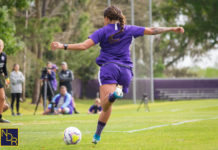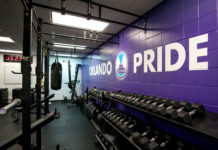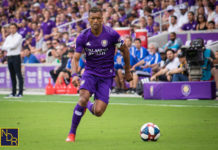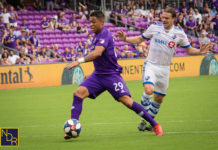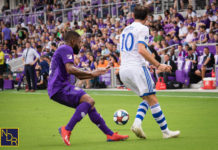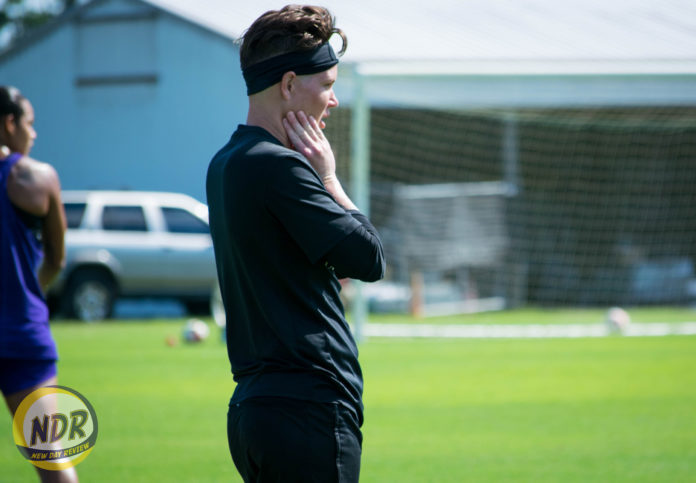
(Photo by Victor Tan / New Day Review)
ORLANDO, Fla. – Goalkeeper. Role model. Sharks. Great hair.
When you think of Orlando Pride goalkeeper Ashlyn Harris, those are some of the first words that come to mind. Following a near-17 minute-long, one-on-one interview with her, I wrote down some of the words that came to me. Here’s what I’ve got:
Proud. Humble. Patient. Great hair.
In my sit-down with the native Floridian, Harris expanded on what it means to know herself physically and how that plays into a relationship with a long-time coach. She showed that being a big-name player and being a mentor are not mutually exclusive statuses. And though she’s endured an injury that has kept her out since May, Harris has shown the wisdom behind patience.
Of course, I couldn’t help but admire her hair too.
On relationship with goalkeeper coach Lloyd Yaxley, on Yaxley’s coaching style.
Well, Lloyd and I—I mean, we’ve been together now for almost five years, and I think there’s an element of trust that goes into that—developing a good relationship with your coach, and I just think that at this point in my career, he knows my body; he knows, you know, all that—when you start a new relationship with a coach, it’s hard because you’re not on, like—there’s a hierarchy. Like, we’re gonna do what I wanna do, but sometimes when you’re at—pushing 30, 31, 32, it’s gotta be a combined effort because usually my body will tell me how sessions will go.
The good thing about Lloyd—it was a no-brainer to bring him here. He’s a fantastic coach, and he’s definitely more on the modern side in understanding it’s not so much about quantity but quality and limiting, you know, how many reps I get; making sure I’m not smashing the ground a ton each day. So that’s kind of where we’re at. I trust him, at the end of the day. I trust that he’s gonna prepare me well enough to be at my best when it comes game time, and that’s doing the right things during the week, and I think, last year, my body was in shambles, and it was very uncomfortable.
I actually didn’t train as much as I wanted to, and it was always just trying to maintain an uncomfortable, like, trying to heal and then push on and heal and push on. It wasn’t a good cycle for me. I think he’s come in; he’s done a really good job. I think he’s helped the younger kids out, and I love his style. It’s very open. It’s like, “Okay, maybe this isn’t working. What can we do different?” And we’re both very open to each other’s ideas, and we bounce off each other, and, at this level and at this age, it has to be that way.
On Yaxley’s usage of unorthodox, non-soccer equipment in training.
It’s hard to compare him to anyone else. Like, you know, the things we can do here are different than things you can do—like, national-team stuff, you can’t—you come in for a week. It’s not a like a developmental stage. Does that make sense? So it’s hard to compare, like—I’ve had some unbelievable goalkeeper coaches. Paul Rogers. Graeme Abel, who’s our goalkeeper coach now. And it’s just like, these goalkeeper coaches are the best at what they do, but it’s hard when you only go in a week, and most of that’s prepping for a game, you know? So, it’s really just brushing a surface area.
Here, you know, I can come out—like,this morning. I came out. I have reaction goggles on that help take away sight. So, how quickly can I pick up a tennis ball being hit at me when my sight’s taken away? A certain amount of beats per second. I don’t have time to do that stuff when I’m at the national team.You know, coming out here this morning, doing reaction stuff with the tennis ball and a racket. He’ll just pepper tennis balls at me. And how many can I catch? How many do I parry in a good position? I mean, I don’t—it’s hard to do those things. We work well because that takes a lot of impact off my legs. So I can get a lot out of training without throwing myself on the ground.
And I think he’s developing, too. I think he gets ideas from—he wasn’t always like this. You know, he loves to learn the game. And what I love most about him is he’ll take a step back, and he’s not a “I know everything” type of guy. He’s like, “I’m gonna go watch Graeme. I’m gonna go watch Paul. I’m gonna go watch the men over here at Orlando City, and I’m gonna take pieces that I think could be really beneficial for us. And that’s a good quality to have and not always just thinking you know everything. And he’s been able to grow a lot from just stepping back and observing.
On bringing Yaxley to the Pride in the offseason.
Yeah, and that’s usually, at this level, that’s how it works. When you’re a goalkeeper, you—it’s a unique position to be in. It’s a different realm. It’s a different game. It’s a different being. So, it’s good to have your comfort, you know? We can sit down and go over video, and I can say stuff to him, and he can say stuff to me—nothing’s ever personal. You know, it’s just like a good balance. We have, like, the best connection together, and that takes years. And when you have a six-month season, and you throw someone new in here, you don’t have time for that, you know what I mean?
So, he came in, hit the ground running. We started training the first day he got here. But, yeah, I’m happy he was able to do this. I’m thankful. I think he’s a large part of my success over the past few years, and it’s only gonna get better from here, you know? And with him here, my length, my life—whatever you want to call it in terms of my soccer length and life—will be prolonged because he gets me. And he gets how hard he can push me without hurting me in certain aspects like that.
On goalkeeper Aubrey Bledsoe stepping into Harris’ shoes as the starting keeper during Harris’ injury.
Yeah, she’s done a great job. I’ve been really proud of her, and she’s worked really hard, and I think she’s made leaps and bounds from last season, and I think the difference between—Aubrey and I have a great connection, a great relationship. And what I always loved most is being in environments where my goalkeepers around me are helping coach me, and it would be easy for me to come in and just focus on myself, but I really wanted to take her under my wing from the beginning and be like, “Hey, this is what you need to do here.
This made me think about it this way. Or maybe try to tweak this that way.” And that, I think, that’s a good thing to have because I see everything behind her. You know, when Lloyd’s kicking balls, his focus is accuracy and all those things. I have a perfect picture of what’s going on, and I think it would be harmful not to say anything, and that’s kind of been my strategy since she’s gotten here is to bring her up along. It pushes the training. It’s better, and I think every goalkeeper at her age needs to have that.
[Too] many times rookie goalkeepers get thrown in, and they get eaten up and spit out, and it hurts their careers, and it takes years to rebuild it and sometimes can be a nightmare. And, as you can see with Aubrey, she takes a year under her belt of understanding the game, learning the game, learning the position, and when she steps in, she can do well. It sets her up for success, not for failure, and I think that’s the biggest thing people are seeing. She’s been ready. She wasn’ put into a situation she wasn’t ready for.
On how she and Yaxley jointly run training sessions.
Yeah, well, I think, for Lloyd, he has—he comes in every morning with his plan. He has it on paper. I look over it—looks great, seems right, but when you get out there, if the movement’s not right, it might look right on paper, but when I’m moving through the goal, if something’s not working, it doesn’t feel natural—everything I replicate is in the game. If I’m having to move in ways I don’t in the game, I’m not gonna do it because it’s just teaching bad habits. So once I get in goal, if I do something a few times, and I’m like, “This isn’t working. Doesn’t feel right.” He can see it, too.
So, both of us will step in, and I’ll be like, “It seems more natural for me to move this way and get set or my body shaped this way, or your angle’s off. Or it cause me to dive backwards.” Those are the things that until I get in and I can really feel it, I have to change it because I’m not just gonna do something to do it. I think it’s important to replicate everything I do even in the weight room. I won’t do squat jumps just to do squat jumps. Like, everything I do, it has to be a purpose in what I’m gonna do out here on the field. So that’s kind of where she’s probably thinking we bounce things off to get it right. That’s the importance is to get it right.
On admiration from Bledsoe and their relationship.
Aubrey and I have a great relationship, same with the team. I’m a vocal leader. That’s my job. So, any time I can step in and help make an impact or coach or do anything like that, I try to do that. I think too many times—I mean, has it been exhausting? Yeah. Because I’m here. I’m at PT. I’m at the hospital, but there are days where I’m not here, and while I’m here, I do; I try to make the most of it. And I think sitting back, and if I see things wrong, I’m becoming more of the problem instead of the solution, so it’s hard for me just to sit back and shut my mouth.
And people—it’s a different perspective coming from me compared to coming from Tom or Khano or Lloyd. Just playing at the level I’ve played at, I think it holds, and it sticks to them, and sometimes I’m really fricking harsh on them, truthfully. I’m the first to say that I’m very—I think that there’s a standard, and the standard should always be held, but I think we’re all human. And there’s an emotional side to it. So, any chance I get to be—put my arm around someone or tell them how well they’re doing or how much I appreciate them, it’s important to get those opponents and because, you know, people don’t know, like, how much you care, like, until you really go out of your comfort and you’re vulnerable.
Yeah, it’s really difficult. It’s tricky in women’s sports because a lot of things do get held personally. So you have to put your arm around people, and if you observe, you know which players that you need kind of lift up, but, also, it’s about being competitive and holding a high standard, and I’m not perfect, and I don’t know if I have the perfect balance, and I think that’s really awesome that my teammates think that of me, and I’m very grateful for that. But every day, I just, like, try to really show up and be me, and that’s giving this team 100 percent of me and not feeling any regrets or leaving any of that out. And that’s all aspects.
On approach to injury.
You know, truthfully, could I have rushed back? Could I have been playing by now? Yes. I just don’t see the point in that. I think Aubrey’s in a really good place. The team is in a good place. She’s doing her job. If it was a nightmare, it would’ve been different. She’s made it easier on me. I just have to be smart about these type of things. With my position, I ripped my quad pretty bad, and I wanna make sure that that doesn’t become a chronic thing. I can’t have every few months—you know, I don’t let it heal, and it’s continuing to nag, and if it’s a World Cup final, if it’s an NWSL final, that’s different.
But she’s stepping it—I trust her. I trust Aubrey. I trust—the team trusts her. You know, if I had an issue where everyone was like, “Oh, Jesus. She’s—” Like, we don’t have that. So it’s giving me the opportunity to sit back, do it at my pace, do it at my comfort because even though Orlando Pride is my priority, there are other priorities that are down the line. I have to be careful that I don’t thrash myself, and now I set myself back four months instead of two months. So, everyone has got together, and, you know, it’s been a process, but it’s been a smart process, and that’s what I love most about my medical staff here and my coaching staff.
They’re not pushing me to do anything I’m not comfortable with which makes life very easy for me. I feel 100 percent good. I’m great in training. I’m training more and harder than I ever have. I’ve been working with PTs; I’ve been working with ATs, the doctors, Lloyd every single day. I’m out here before anyone. So it’s only helping me, but I just gotta ease my way in. You know, a normal player, you get 20 minutes. You know, like an Alex coming off a hamstring, she’ll play 10 minutes; then she’ll play 20 minutes; then she’ll play 45 minutes; then she’ll play, hopefully, 90.
I don’t have that luxury. I have to be 100 percent and 100 percent ready to be played in. We don’t even have the numbers this week to play big-sided. So all week, it’s been small-sided stuff. So I haven’t even seen the bigger picture. And to kind of throw myself into that this week, it’d be like throwing me to the wolves. So, that’s kind of the process of where we’re at. But, yeah, I’m 100 percent healthy and fit. I’m ready to go. It’s just gotta be the right timing. Everything is a timing thing right now.
For more on Harris, as she returns to the pitch, follow Victor Tan on Twitter at @NDR_VictorTan.

